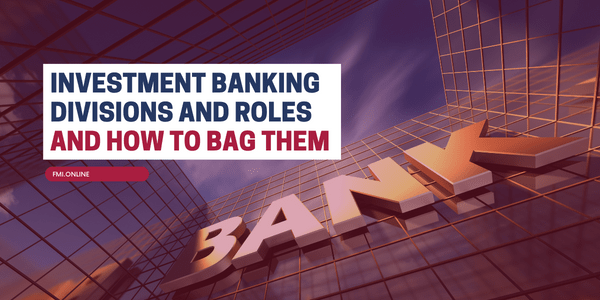Many look at investment banking as a cushy career option but not everyone fully understands what investment bankers do. Within investment banking, there exist multiple divisions called IBDs (Investment Banking Divisions).
These are various departments within the profession for different tasks such as capital raising (underwriting in equity, debt, and hybrid markets), executing mergers and acquisitions, advisory services, and structuring the Initial Public Offer for a company, among others.
Within an investment bank, there is a clear distinction between the Investment Banking Division (IBD) and other areas of the bank such as:
- Equity research
- Sales and trading
- Commercial banking
- Asset management
- Retail banking
Here are the various Investment Banking Divisions:
- Mergers & Acquisitions (M&A) – In this division, investment bankers provide advisory services on the consolidation of two or more companies. This could be through a merger, sale, or purchase. The services typically comprise creating an in-depth analysis and valuation of the companies involved, the risks and benefits of the deal, the pricing element and so on. There are 9 stages of Mergers and Acquisitions, and investment bankers are involved in most of them.
- Leveraged Finance – This involves lending money to companies to help with the financing of acquisitions.
- Equity Capital Market – Investment bankers provide advisory services on raising equity through products like shares, options, futures, etc. They also help structure and execute the IPO process.
- Debt Capital Markets – This involves advice on raising debt for a company to finance its acquisitions.
- Restructuring – Investment bankers are often called upon if a company is looking to restructure its financial blueprint for increased profitability.
Within IBD, there are 5 major roles for any division:
- Analyst – This is the entryway after college into the IB industry. Investment banking analysts are known to work almost entirely on grunt work such as valuing companies, creating models, drafting pitch books, extensive research, creating spreadsheets etc. Analysts are well known for working 80-100 hours per week and usually start out with a salary of $100,000. To become an analyst, aspirants usually start out with an internship in the junior year of University, which typically turns into a full-time offer after finishing their studies.
- Associate – An associate manages analysts, while also conducting some financial modelling and drafting pitch books. This position is either applied for after an MBA or after the third year of being an analyst. The role involves a fair amount of coordination and managing the analysts’ work. Hence, communication skills and organisation are key for an associate. They are known to make around $150,000 a year and work either the same or slightly fewer number of hours than analysts.
- Vice President – After their third year, exceptional associates are trained for a vice president position. In this role, you manage associates, design pitch books, attend client meetings, etc. This is a managerial position as the majority of your work involves overseeing your subordinates’ work and meeting the director’s expectations. Vice presidents work heavily with clients and close significant deals. According to Wall Street Oasis, the average base salary for an IB VP is over $200,000, but a significant chunk comes from bonuses, which can surpass the salary in a good year.
- Senior Vice President / Director – Most veteran investment bankers go as far as senior VP. Here the responsibility shifts almost entirely to scouting for new lucrative businesses. This requires major travelling, and the compensation ranges between $300,000 and $350,000 base salary per year.
- Managing Director – This is the highest position in the IB hierarchy below a group head or CXO. It is focused almost exclusively on sourcing and winning new business/clients. They have immense authority and are responsible for the profitability of the bank through strategy, bringing in high-end clients, and maintaining relationships with them. They are not involved in the deals particularly. MDs end up making over $500,000 in a year without bonuses, and nearly $1 million with them.
How to forge a successful career in IBD?
With the various roles, descriptions and compensations in IBD, one can quickly gauge that it is a highly demanding career that requires a certain personality type to be successful. Here are the traits you should evaluate yourself for when looking to start a career in investment banking:
- Intellect
Investment banking requires you to be proficient in analytics, finance, mathematics, and problem-solving. A sharp intellect can help you ace these skills and have a tactical approach toward solutions. While it’s not mandatory to have a degree in finance or economics, a strong intellect can help you navigate your role as an investment banker more smoothly. You can also build your intellect and knowledge through courses such as this primer on all the basics of investment banking.
- Discipline
It is common knowledge that investment bankers work long hours. This requires a certain discipline whether it pertains to staying organised, prioritising your day, and operating efficiently without giving in to stress.
- Creativity
This might be an underrated skill for an investment banking job but creativity allows people to look for innovative solutions to a problem. This can help adopt a new way of looking at or doing things. This can also elevate your personality as an investment banker.
- Ambition
While the pay in IBD roles is lucrative, it does come with the challenge of a highly demanding job. To flourish in such an environment and endure its stressful nature, one must be devoted to working in this industry. If you’re ambitious and driven, you will enjoy the new aspects of your job and be keen on learning more. Without ambition, the analytical and at times, repetitive nature of the job can seem mundane and underwhelming.
- Relationship-Building Skills
Investment bankers work regularly with clients. Roles that are managerial in nature also require solid relationships with both subordinates and directors. Hence, relationship-building is a key aspect of investment banking. Interpersonal skills can help you understand client needs and maintain outstanding connections with them. While these skills can be polished over time, all aspirants in this field must work actively toward learning these skills from the beginning.
Conclusion
From raising capital to advising on high-level M&As or working in a high-pressure environment, IBD comes with its own set of challenges. Yet, with the right attitude and skills, you can manoeuvre through these and flourish in such an industry.
You can begin by charting your desired professional journey for the various roles and then build on each skill required to get to your position of choice. While you will learn many technical skills on the job, ensure that you work equally to hone some of the transferable skills such as creativity, problem-solving, discipline, and relationship-building.












 60+ hours
60+ hours 9 courses
9 courses



